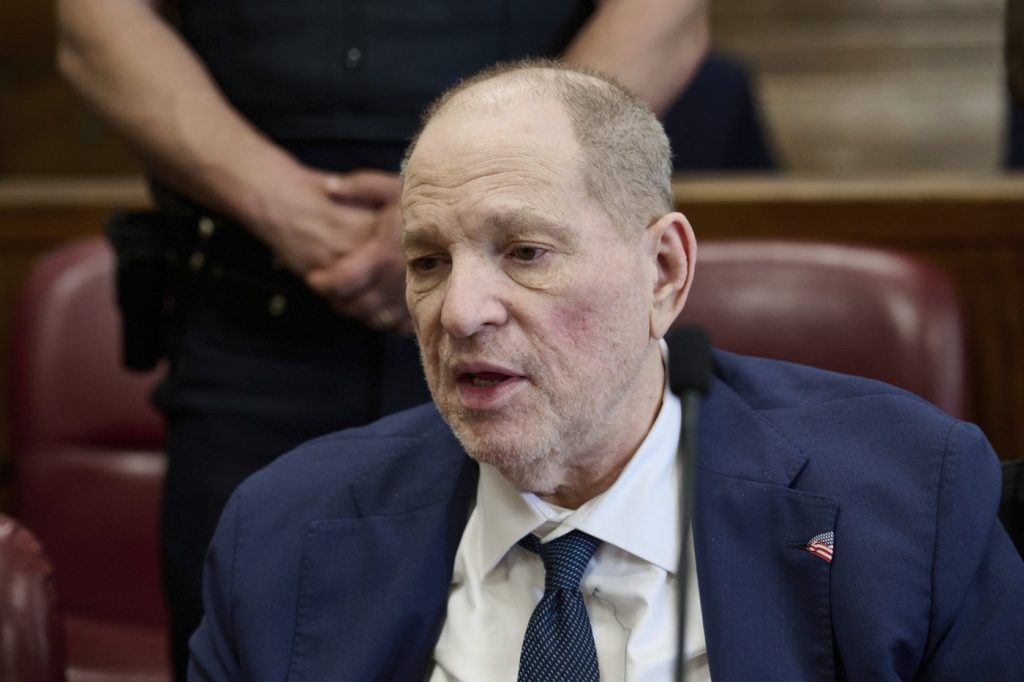NEW YORK (AP) — Following a tumultuous day at Harvey Weinstein's sex crimes retrial, jurors are set to resume deliberations on a remaining charge on Thursday, contingent upon the foreperson’s participation. The jury's initial verdict, announced on Wednesday, resulted in Weinstein being convicted of one of the significant charges but acquitted of another, both relating to allegations of forcing oral sex on women in 2006.
The jury, consisting of seven women and five men, reached these decisions last Friday, as confirmed by the foreperson to the judge. However, the formal announcement of the verdict was postponed until Wednesday at the request of Judge Curtis Farber, who inquired if there was consensus on any of the charges.
Jurors found themselves at an impasse regarding a third charge — a rape accusation involving a woman who also claimed to have had a consensual relationship with the erstwhile Oscar-winning producer. This third-degree rape charge comes with a lesser penalty than the two other counts. Weinstein maintains his innocence, claiming the charges are unfounded.
During an unusual exchange with the judge prior to the announcement of the partial verdict, Weinstein expressed concern about the fairness of the ongoing trial, especially following issues raised by two jurors regarding the proceedings. “I can’t be judged by a situation that’s going on like this,” Weinstein, 73, stated, accusing the judge of “endangering” his right to a fair trial.
Issues within the jury began to surface on Friday, when one juror requested to be excused, claiming another juror was being treated unfairly. On Monday, the foreperson voiced concerns regarding pressure from fellow jurors, alleging they were attempting to persuade others to change their minds and discussing information outside the trial's charges.
This escalating tension culminated in a closed-door discussion on Wednesday, during which the foreperson revealed that he felt threatened after being yelled at by another juror, who ominously stated, “You going to see me outside.” The foreperson expressed feelings of fear, prompting Judge Farber to allow the jury to go home for the day after the partial verdict. Subsequently, the foreperson sought to return to court to discuss his concerns, affirming his willingness to attend deliberations on Thursday, though he indicated he would not be compelled to enter the jury room if he felt uncomfortable.
It remains uncertain how deliberations can continue should the foreperson decide against participating, casting further ambiguity over the trial's proceedings. Weinstein’s previous conviction five years ago had notably marked a significant moment in the #MeToo movement, representing the downfall of one of Hollywood's most influential figures. However, that conviction was overturned last year, leading to the current retrial being held in the same Manhattan courthouse.
Weinstein's accusers have alleged that he exploited his Hollywood influence to lure women under the guise of career opportunities, subsequently coercing them into unwanted sexual encounters. Conversely, his defense has depicted the accusers as individuals who pursued relationships with Weinstein in hopes of advancing their careers and later claimed victimhood for personal gain.
Miriam Haley, one of Weinstein’s accusers and a production assistant, testified that the recent verdict “gives me hope.” Kaja Sokola, another accuser, referred to the outcome as “a big win for everyone,” despite Weinstein being acquitted of forcibly performing oral sex on her as a 19-year-old fashion model. This accusation was introduced after the retrial was mandated. Jessica Mann, the third accuser, continued to await a verdict regarding her own claims, having testified extensively about her alleged assault in a Manhattan hotel room and the complexities of her later encounters with Weinstein.
Weinstein has also faced a conviction for raping another woman in California and is actively appealing that verdict. The Associated Press typically refrains from naming individuals who allege sexual assault unless they consent to being identified, which in this case, Haley, Mann, and Sokola have done.











